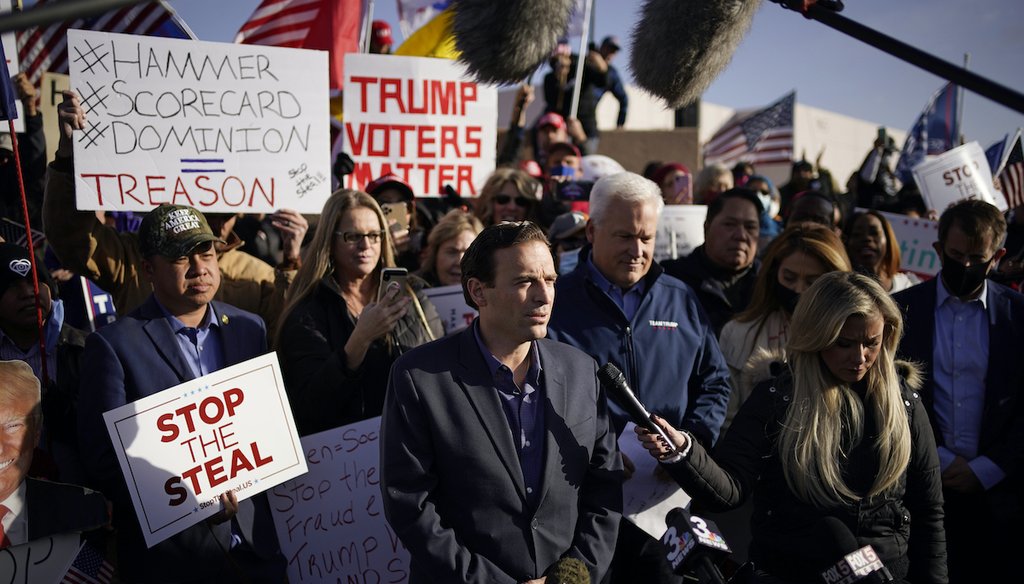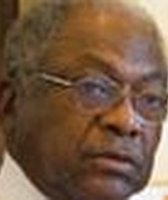Get PolitiFact in your inbox.

On Nov. 8, 2020, former Nevada Attorney General Adam Laxalt, middle speaking at microphone, and American Conservation Union Chairman Matt Schlapp speak during a news conference outside of the Clark County Election Department in North Las Vegas. (AP)
If Your Time is short
-
Donald Kirk Hartle, a Nevada Republican, told a TV station in November that he was “surprised” that someone cast a ballot in the name of his wife, Rosemarie Hartle, who died in 2017.
-
The Nevada attorney general announced Oct. 21 that his office charged Hartle himself with felonies related to casting a ballot in Rosemarie’s name in the 2020 general election.
-
Election experts say ballots are rarely cast in the name of a dead person, but when it does happen, it’s often by a family member.
After Joe Biden won the election in Nevada in 2020, Donald Trump’s allies cried fraud. And they had the poster child of an example: a man who said he felt "disbelief" after discovering that someone cast a ballot in his dead wife’s name.
"I was surprised because she passed away three years ago," Donald Kirk Hartle, a Republican, told KLAS TV about a week after the election. "That is pretty sickening to me, to be honest with you."
Hartle’s story gained attention as GOP leaders and pundits sought to challenge Biden’s victory in Nevada, where he won by nearly 34,000 votes.
The Nevada GOP, tweeting an obituary of Rosemarie Hartle, wrote: "The media needs to understand we are finding concrete cases of voter irregularities that they must expose." American Conservative Union president Matt Schlapp held a press conference to declare that "hundreds of dead people" voted in Clark County, which includes Las Vegas. Conservative pundit Dinesh D’Souza tweeted a news report about Hartle, stating "are you really going to tell me voter fraud doesn't exist?"
"We don’t know who did it," Fox News’ Tucker Carlson said. "We wish we did, we should know. It’s fraud. It's a threat to our system, and it's being hidden by a news media totally vested in a Joe Biden presidency."
Nearly a year later, Nevada Attorney General Aaron Ford says he thinks he does know who cast the ballot: It was Hartle himself.
Ford announced Oct. 21 that Hartle, 55, of Las Vegas, was charged with voting using the name of another person and double-voting. The charges are both felonies punishable by a $5,000 fine and a prison term of up to four years. The criminal complaint states that Hartle voted twice in late October 2020, including once in the name of Rosemarie Hartle. He is set to appear in court Nov. 18.
The case was investigated by the office of Secretary of State Barbara K. Cegavske.
The two-page criminal complaint includes no details explaining the prosecutor’s evidence, which makes Donald Hartle’s possible motives unclear.
Donald Hartle told KLAS TV in November that Rosemarie’s ballot never arrived at his home. But the TV station found that BallotTrax, the system Clark County uses to track ballots, shows her ballot had been submitted. The KLAS TV reporter said in his 2020 report that Clark County officials said the signature with the ballot "is a match to what’s on their records."
Donald Hartle’s LinkedIn profile shows that he is senior chief financial officer and treasurer for the Ahern Family of Companies, a construction equipment group that includes Xtreme Manufacturing in Henderson, Nev. Xtreme Manufacturing was the site of a September Trump rally that led the city to fine the company $3,000 for violating Nevada’s COVID-19 emergency directives.
A spokesperson for the attorney general’s office said it’s not providing additional information. David Chesnoff, Hartle’s lawyer, didn’t respond to PolitiFact but told the AP, "Mr. Hartle looks forward to responding to the allegations."
Election experts say voting ballots addressed to dead people is rare
We may not learn more about the prosecutor’s evidence until court hearings, but what we know about dead people on the voter rolls suggests that there’s generally not much risk of fraud through the casting of dead people’s ballots.
"The numbers here are minuscule and in 2020, would not have affected the outcome of the election," said Lorraine Minnite, a professor at Rutgers University-Camden and author of "The Myth of Voter Fraud.
In Nevada, the state elections office receives death data from the state’s vital statistics office on a daily basis. It also gets death data every other month from the Social Security Administration. The state then passes along the data to the counties so that they can remove dead voters from their registration lists, Nevada election officials told us in 2020. Many states including Nevada also belong to the Electronic Registration Information Center, a consortium that helps states share and update voter registration information.
Despite these safeguards, Rosemarie Hartle was still on the voter rolls years after her death. Clark County spokesperson Dan Kulin said he couldn’t comment on why, citing an ongoing criminal investigation.
But other election experts told us that no system to update voter rolls is perfect.
"That his wife was on the voter registration rolls although she died in 2017 is not unusual, as these reports are often incomplete, or there may have been an administrative error that did not result in the election official removing the deceased voter," said Thessalia Merivaki, a political scientist at Mississippi State University.
Because of the pandemic, Nevada mailed absentee ballots to all registered voters, which was why it was possible for a ballot to be sent to a dead voter who remained on the rolls.
RELATED VIDEO
The role of family members
Family members can also alert election offices if a registered voter in their household has died.
Maintaining an accurate voter registration list "requires a comprehensive program that relies not only on intergovernmental data, but on everyday citizens doing what is right: returning to sender any mail received (indicating) that the person no longer lives at that address," said Tammy Patrick, a former Maricopa County, Ariz., election official who now works for the Democracy Fund.
Since Rosemarie Hartle died in 2017 and received a ballot for the November 2020 election, it’s possible election officials had sent numerous mailings addressed to her. If Donald Hartle had responded to one of the mailings indicating that she had died, that would have moved her to an inactive status, and her ballot wouldn’t have been issued, Patrick said.
It is exceedingly rare for ballots to be cast by another person on behalf of a dead voter, Patrick said. But when it does happen, it’s usually by a family member.
"Some may say that they did it for their deceased loved one ‘in their honor’ and didn’t think they were committing a serious crime," Patrick said. "Others know exactly what they are doing."
There were isolated examples in 2020 of relatives being charged for seeking or casting a ballot on behalf of a dead relative, including in Florida and Pennsylvania.
A Marple, Pa., man who voted for Trump on behalf of his long-dead mother in 2020 told the judge: "I was isolated last year in lockdown. I listened to too much propaganda and made a stupid mistake."
Trump and allies promoted voter fraud falsehoods in Nevada
Nevada was one of the many states where Trump and his allies spread falsehoods about voter fraud in 2020.
At a Nevada rally in September, Trump falsely said that ballots were being sent to dead people (and dogs) in Nevada.
Before the June primary, about 226,000 ballots were returned to Clark County elections officials because the voters no longer lived there. Social media posts falsely conflated those returned ballots with fraud. Election officials said that the returns showed that the system worked as designed because postal workers are not allowed to forward ballots — they are required to return them.
The Nevada secretary of state’s post-election Myths vs. Facts page stated that "while we are pursuing action in a number of isolated cases, we have yet to see any evidence of widespread fraud."
The Nevada GOP delivered boxes of records to Cegavske alleging election violations, including a claim that 1,506 votes were cast in the names of persons who are deceased. Cegavske wrote in April that her review of the allegations found that the state Office of Vital Statistics reported that only 10 of the 1,506 records were identified as being deceased according to their records. The cases regarding those 10 individuals were referred for investigation.
Cegavske concluded that the Nevada GOP’s allegations were "based largely upon an incomplete assessment of voter registration records and lack of information concerning the processes by which these records are compiled and maintained."
Trump allies sought to overturn results in court, but that didn’t work either.
About a month after Trump lost Nevada, District Court Judge James Russell ruled against a request by electors for Trump that he declare Trump the winner or void Biden’s win. Russell rejected the plaintiffs’ allegations that 500 deceased people voted, writing: "the court finds that there is no credible or reliable evidence that the 2020 General Election was affected by fraud."
RELATED: Trump’s misleading claim about ballot signatures in Nevada
RELATED: Trump’s falsehoods about mail voting in Nevada, fact-checked
PolitiFact researcher Caryn Baird contributed to this report.
Our Sources
Nevada Attorney General Aaron D. Ford, Attorney General Ford Announces Voter Fraud Charges, Oct. 21, 2021
Nevada Secretary of State Barbara Cegavske, Re: Elections Integrity Violation Reports, April 21, 2021
KLAS TV, I-Team: County received mail-in ballot from Nevada woman who died in 2017; state investigating 2 allegations, Nov. 9, 2020
KLAS-TV, I-Team: Man who claimed dead wife’s mail-in ballot showed voter fraud accused of voting twice, Oct. 21, 2020
Nevada Independent, Prosecutors: Clark County man touted in Republican election fraud allegations voted his dead wife’s ballot , Oct. 21, 2021
Nevada GOP, Tweet, Nov. 7, 2020
Nevada GOP, Tweet, Nov. 10, 2020
Dinesh D’Souza, Tweet, Nov. 11, 2020
Fox News, Tucker Carlson: Yes, dead people voted in this election and Democrats helped make it happen, Nov. 11, 2020
Kirk Hartle, LinkedIn profile, Accessed Oct. 25, 2021
Manatee County Court Records, Order of probation in Larry Wiggins case, Dec. 1, 2020
ERIC, List maintenance statistics, Dec. 31, 2020
Nevada Secretary of State post-2020 general election, Myths vs facts,
AP, Las Vegas man charged with voting twice in November 2020, Oct. 21, 2021
3 News Las Vegas, Nevada GOP, Trump officials allege voting fraud in Nevada, Nov. 9, 2020
Washington Post, The voter-fraud allegation that perfectly captures the post-2020 Republican Party, Oct. 22, 2021
Bradenton Herald, Bradenton voter tried to get mail-in ballot for dead wife ‘to test the system,’ cops say, Oct. 2, 2020
Times Leader, "Dude in Forty Fort’ pleads guilty to absentee ballot violation, Aug. 16, 2021
AP, Man admits to voter fraud in casting dead mother’s ballot, April 30, 2021
Email interview, Ashley M. Forest, Nevada Attorney General’s Office spokesperson, Oct. 25, 2021
Email interview, Email interview, Tammy Patrick, senior advisor to the elections program at Democracy Fund and former federal compliance officer for Maricopa County elections, Oct 25, 2021
Email interview, Amber McReynolds, founding CEO of the National Vote at Home Institute, Oct. 25, 2021
Email interview, Thessalia Merivaki, an expert on voter administration and assistant professor of political science at Mississippi State University, Oct. 25, 2021
Email interview, Lorraine Minnite, associate professor of public policy at Rutgers University-Camden, Oct. 26, 2021
Email interview, Dan Kulin, Clark County Election Department spokesperson, Oct. 25, 2021












































